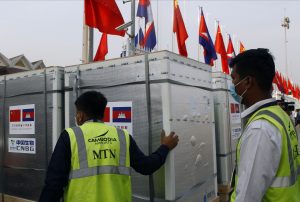COVID-19 has reshaped everything, not least global politics. In a world where access to limited vaccine supplies is the only way to end the crisis, so-called “vaccine diplomacy” has emerged as a new channel through which major powers seek to curry favor and shape the international environment to their benefit, doling out vaccines to favored countries according to perceived national interest.
Billions of vaccine doses have now been pledged for international donation, with the bulk coming from the United States and China, as well as the European Union and its members. Although much has been achieved, there is nonetheless little doubt that the global vaccine effort is falling short. Vaccine doses have been donated based on overly narrow geopolitical considerations rather than need or equity. The multilateral COVAX initiative remains underfunded and struggling to fulfill its mission for global vaccine equity. And the technology behind the leading vaccines is not being shared widely enough, despite the obvious need to expand global vaccine supplies.
In an age of escalating great power rivalry, overseas vaccination efforts are too often mistaken for charity and pursuing the national interest conflated with playing for short-term geopolitical gain. If vaccine diplomacy is the new great game, it is being played wrong by all sides, with the risk that no one will be left a winner.
The heart of the problem is the failure to fully recognize that international vaccine equity is a global public good in every major power’s self-interest. Anything less risks prolonging the pandemic and fuelling instability. At present, less than two-thirds of the world’s population have received at least a single vaccine dose. While around 70 percent of people in rich countries have done so, the figure is only about 10 percent in low-income countries. The need for booster shots in response to the Omicron variant will only widen the gap.
This is not only a moral failing but also means COVID-19 still has a pool of billions of unvaccinated people among which to circulate and mutate into more dangerous forms.
The possibility of more dangerous future variants could prove especially dangerous for China, given its reliance on less effective homegrown vaccines and its consequent reliance on a costly zero-COVID strategy.
But Western powers are hardly immune. While the hope may be that widespread immunity, due to vaccination or previous infection, can prevent a renewed health crisis, there is no guarantee that some future variant will not evade this immunity and existing treatments in dangerous ways. Furthermore, even an endemic COVID-19 could still imply a high disease burden and repeated waves of infection capable of putting intense pressure on hospital systems and creating substantial economic disruption.
Moreover, persistent international vaccine inequity carries other important geopolitical consequences for Western powers – weakening key emerging partners in the Indo-Pacific vital to the regional balance of power amid a rising China and undermining the liberal international order that the West seeks to defend.

































